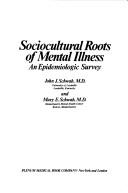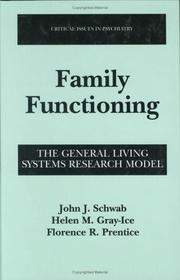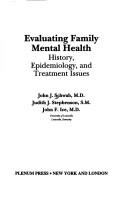| Listing 1 - 7 of 7 |
Sort by
|

Abstract | Keywords | Export | Availability | Bookmark
 Loading...
Loading...Choose an application
- Reference Manager
- EndNote
- RefWorks (Direct export to RefWorks)
Mental illness --- Psychiatric epidemiology --- Social psychiatry --- 316:61 --- Psychiatry, Social --- Clinical sociology --- Mental health --- Psychiatry --- Social medicine --- Social psychology --- Epidemiological psychiatry --- Epidemiology, Psychiatric --- Epidemiology --- 316:61 Medische sociologie --- Medische sociologie --- Etiology
Book
Abstract | Keywords | Export | Availability | Bookmark
 Loading...
Loading...Choose an application
- Reference Manager
- EndNote
- RefWorks (Direct export to RefWorks)
Book
Year: 1974 Publisher: New York, N.Y. Grune & Stratton
Abstract | Keywords | Export | Availability | Bookmark
 Loading...
Loading...Choose an application
- Reference Manager
- EndNote
- RefWorks (Direct export to RefWorks)
Book
Abstract | Keywords | Export | Availability | Bookmark
 Loading...
Loading...Choose an application
- Reference Manager
- EndNote
- RefWorks (Direct export to RefWorks)

ISBN: 0306463962 9786610207435 1280207434 0306471914 Year: 2000 Publisher: New York : Kluwer Academic Publishers,
Abstract | Keywords | Export | Availability | Bookmark
 Loading...
Loading...Choose an application
- Reference Manager
- EndNote
- RefWorks (Direct export to RefWorks)
The family, that most fundamentalof human groups, is currently perceived to be changing in response to social, biological, cultural and technological developments in our postmodernsociety. While the observed changes in families have been considered by some sociologists to be evidence of adaptation and, therefore, normal, the authors of this volume, consider them maladaptive. Viewing society from the point of view of clinical psychiatry, they point to greatly increased numbers of children born to single mothers, soaring rates of divorce, a statistically confirmed increase in mental disorders, increase in reported incest, high rates of depression in younger people and escalation of the amount of reported family violence as evidence that the family, as a social institution, is in crisis and can either move toward renewed vitality or continued deterioration. Perceiving a need to obtain information about family functioning that might lead to the increased stability and well-being of this critically important type of system, Dr. John Schwab and his associates designed and camed out a research program that began with a thorough review of relevant literature beginning with LePlay’s study of 300 families in the 1850’sand including important recent statistical studies. They found that although these studies represent advances in understanding the family system, some serious problems with the research remain, one of which is confounding variables such as family function and mental or substance abuse disorders so that if a family member has a problem, such as drug abuse, the family is classifiedasdysfunctional.
Family assessment. --- Families --- Mental health. --- Psychiatry. --- Psychology, clinical. --- Social sciences. --- Social work. --- Clinical Psychology. --- Social Sciences, general. --- Social Work. --- Clinical psychology. --- Benevolent institutions --- Philanthropy --- Relief stations (for the poor) --- Social service agencies --- Social welfare --- Social work --- Human services --- Behavioral sciences --- Human sciences --- Sciences, Social --- Social science --- Social studies --- Civilization --- Psychiatry --- Psychology, Applied --- Psychological tests --- Medicine and psychology --- Mental health --- Psychology, Pathological --- Behavioral assessment
Book
ISBN: 0876301855 Year: 1979 Publisher: New York
Abstract | Keywords | Export | Availability | Bookmark
 Loading...
Loading...Choose an application
- Reference Manager
- EndNote
- RefWorks (Direct export to RefWorks)
Epidemiology --- Psychology, Pathological --- Social psychiatry --- Diseases --- Public health --- Psychiatry, Social --- Clinical sociology --- Mental health --- Psychiatry --- Social medicine --- Social psychology --- Etiology --- Florida --- Toronita --- FL --- Fla. --- Flor. (Florida) --- Estato de Florida --- Штат Фларыда --- Shtat Flaryda --- Фларыда --- Flaryda --- Флорида --- Talaith Florida --- Łóodah Hahoodzo --- Florida osariik --- Φλοριντα --- Phlorinta --- Πολιτεία της Φλόριντα --- Politeia tēs Phlorinta --- Estado de Florida --- Florido --- Floride --- 플로리다 주 --- Pʻŭllorida-ju --- 플로리다 --- Pʻŭllorida --- Pololika --- Pluuriitaa --- פלורידה --- Floridah --- フロリダ州 --- Furorida-shū --- フロリダ --- Furorida --- Floryda --- Plorida --- Estado ng Plorida --- Florida eyâleti --- Штат Флорида --- Shtat Floryda --- 佛罗里达州 --- Foluolida Zhou --- 佛罗里达 --- Foluolida --- Florida (Territory) --- East Florida --- West Florida --- Social conditions. --- Sociology of health --- Florida [state]

ISBN: 0306444364 Year: 1993 Publisher: New York Plenum
Abstract | Keywords | Export | Availability | Bookmark
 Loading...
Loading...Choose an application
- Reference Manager
- EndNote
- RefWorks (Direct export to RefWorks)
| Listing 1 - 7 of 7 |
Sort by
|

 Search
Search Feedback
Feedback About UniCat
About UniCat  Help
Help News
News